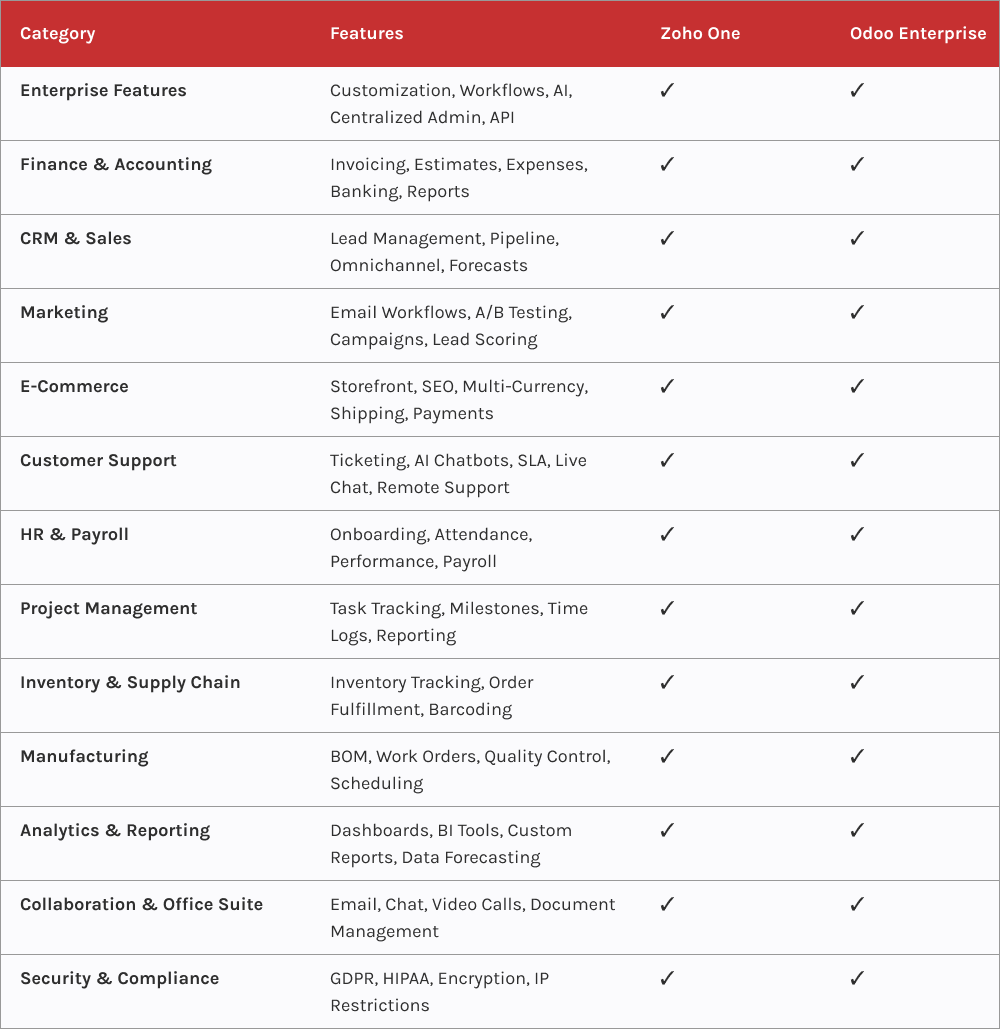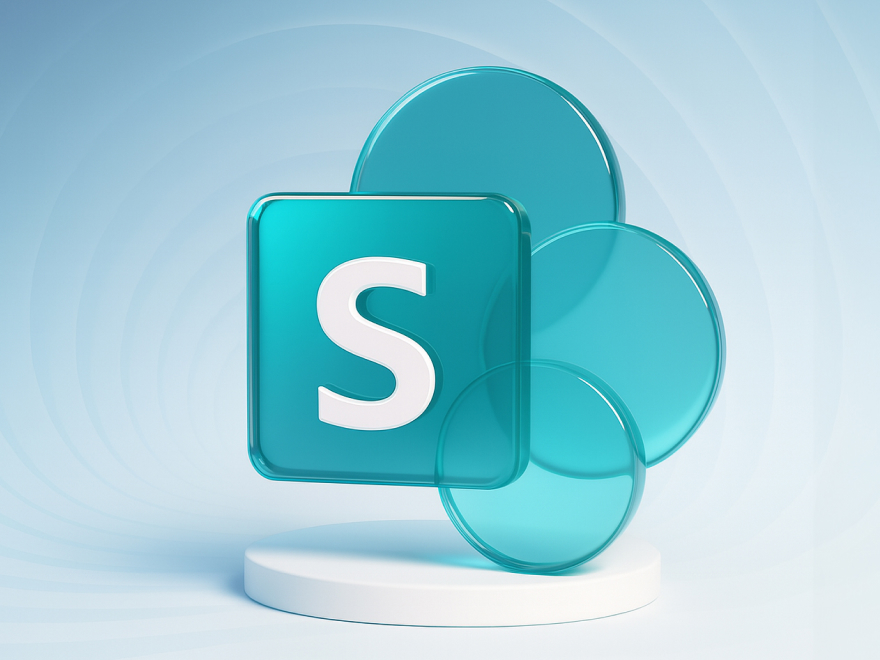Meldingen din er sendt.
Vi behandler forespørselen din og kontakter deg så snart som mulig.
Skjemaet har blitt sendt inn.
Mer informasjon finner du i postkassen din.


Bedrifter og institusjoner av alle størrelser sliter ofte med å forene siloprosesser, etablere effektivt samarbeid mellom avdelinger og sikre dataintegritet. Med CRM og ERP kan bedrifter løse disse utfordringene. Med CRM- og ERP-programvare kan bedrifter for eksempel automatisere en rekke aspekter ved de daglige rutinene, blant annet regnskap, rapportering, innkjøp, salg, lager, personal og kunderelasjoner.
Hvis du ønsker å nå disse målene, bør du vurdere å innlemme CRM- og ERP-løsninger i bedriftens arbeidsflyt. Zoho og Odoo er to ledende leverandører av ERP- og CRM-programvare som gjør det mulig for bedrifter på tvers av ulike domener å løse sine utfordringer. Begge har mange gode funksjoner og fordeler, så vår oppgave er å hjelpe deg med å finne det som passer best til dine behov og mål. La oss komme i gang!
Ønsker du å automatisere arbeidsflyten med en ERP-app?
Ta kontakt med oss, så hjelper vi deg med å finne den beste løsningen for dine behov
Zoho ble etablert i 1996 og tilbyr en skybasert pakke med over 45 apper for en rekke forretningsaktiviteter som omfatter CRM, ERP, regnskap, personaladministrasjon og prosjektkontroll. Flaggskipet - Zoho CRM - tilbyr kraftige verktøy for å administrere salg, markedsføring og kundeservice.
En annen komponent i løsningen er Zoho ERP, som gjør det mulig for organisasjoner å bedre administrere lagerbeholdning, ordresporing, økonomi, produksjonsprosesser og HR-operasjoner. Alt dette gjør Zoho til et godt valg for de som ønsker en omfattende, men likevel rimelig løsning.
Blant brukerne er kjente selskaper som Zomato, Suzuki Motors, Amazon India og mange andre. Zomato koordinerer for eksempel samarbeid på tvers av team med Zohos ERP og klarte å øke effektiviteten på tvers av lokasjoner, mens Suzuki Motors forbedret forholdet til forhandlerne.
Odoo ble lansert i 2005 og er en åpen kildekode-plattform som har både ERP- og CRM-løsninger for salg, finansiell rapportering, personaladministrasjon og kundebehandling. Odoos økosystem har faktisk over 30 apper for å løse forretningsutfordringer.
Og akkurat som Zoho tilbyr Odoo både ERP og CRM for bedrifter i alle størrelser. Mens Odoo ERP fokuserer på oppgaver innen områder som innkjøp, regnskap og produksjon, hjelper Odoo CRM med å automatisere salg, sporing av kundeemner og markedsføringskampanjer.
Odoos åpne kildekode gjør det mulig for programvareingeniører å bidra fritt til plattformen. Programmerere kan lage nye funksjoner, moduler, forbedringer og integrasjoner som brukerne deretter kan få tilgang til gjennom Odoos appbutikk. Per i dag har Odoo over 16 000 fellesskapsutviklede apper.
Viktige markedsaktører som Toyota, Hyatt og Danone har konfigurert Odoo for å nå sine spesifikke mål. Toyota har for eksempel optimalisert lagerstyringen og kundehåndteringen, og Danone har pleiet forholdet til viktige interessenter.
Zoho CRM er et skybasert system som hjelper bedrifter med å effektivisere operasjoner som leadgenerering/-scoring, sporing av salgspipeline og kundeservice. Plattformen gjør det mulig for bedrifter å automatisere alle aspekter av salgsprosessen, inkludert avtale-, konto-, kontakt- og godkjenningshåndtering.
I tillegg gjør Zoho CRM det mulig for bedrifter og institusjoner å komme i kontakt med kunder gjennom flere kanaler som SMS, sosiale medier, live chatter, samtaler og selvbetjeningsportaler. Det har også avanserte analyser for datadrevne beslutninger, tilpassbare dashbord for KPI-sporing i sanntid og AI-drevne prediksjoner for å drive salgsveksten.
Løsningen er integrert med en rekke verktøy, for eksempel en kalender, Google Workspace og Office 365. I tillegg gjør integrasjonen med Zoho Finance Suite det mulig for salgsspesialister å generere tilbud og innkjøpsordrer umiddelbart.
Med Zoho ERP kan bedrifter effektivisere en rekke arbeidsflyter - tenk salg, ordrehåndtering, lager, innkjøp, produksjon og rapportering. I tillegg kan de dra nytte av sanntidsstyring av forsyningskjeden.
Zoho ERP tilbyr et bredt utvalg av forhåndsbygde apper som er utviklet for å kickstarte din tilpasset løsning for helhetlig ressursplanlegging. På denne måten kan bedriftene raskt tilpasse applikasjonene til sine spesifikke behov og krav, fra generering av innhold til håndtering av franchisevirksomhet, skatter og avgifter og fakturaer.
På IT- og administrasjonssiden kan Zoho ERP-programvaren automatisere funksjoner som timeplanlegging, forvaltning av eiendeler og løsning av saker.
Odoo CRM er utviklet for å gjøre det mulig for bedrifter i alle størrelser å effektivisere salgsprosesser og forbedre kunderelasjoner. Plattformen er tilgjengelig både i skyen og lokalt, og lar salgs-, markedsførings- og kundeservicespesialister spore leads, administrere salgspipelines og automatisere oppfølgingsoppgaver.
Salgsteamene kan bruke tilpassbare dashbord og integrerte kommunikasjonsverktøy i sine daglige oppgaver, og Odoos avanserte lead-scoring gjør det mulig å prioritere muligheter med høy verdi, for eksempel å lukke de mest potensielle avtalene. I tillegg gjør Odoo CRM det mulig å dra og slippe salgsmuligheter gjennom ulike stadier av salgsprosessen.
Ved å bruke Odoo CRM kan bedrifter etablere et mer effektivt samarbeid, siden systemet integrerer alle kommunikasjonskanaler i ett og samme grensesnitt. For eksempel blir innkommende e-poster automatisk lagt til i pipelinen, slik at de ansatte aldri går glipp av viktige samtaler og meldinger.
Odoos ERP gjør det mulig for bedrifter å effektivisere en rekke ulike aspekter, fra regnskap og produksjon til innkjøp. Odoo gir avansert lagerovervåking med automatisk påfylling, slik at du aldri går tom for varer.
ERP-systemet støtter også drift i flere selskaper, noe som forenkler økonomi- og ressursstyringen på tvers av flere lokasjoner eller datterselskaper. I tillegg er Odoo ERP fullpakket med verktøy for å spore alt fra produksjonstidslinjer til budsjettering.
Enten du foretrekker en skybasert løsning eller et lokalt oppsett, gir Odoo deg fleksibiliteten til å velge det distribusjonsalternativet som passer deg best. Løsningen støtter også en rekke språk og valutaer, noe som gjør den til et godt valg for globale selskaper. Kort sagt er Odoo ERP ikke bare en programvare, men en tilpassbar verktøykasse for å styre forretningsdriften.
Zoho er en brukervennlig plattform som enkelt kan tilpasses innenfor app-pakken. Men hvis du trenger å legge til noe utenfor Zohos økosystem, må du engasjere et utviklingsteam for å bygge tilpassede integrasjoner.
Odoo utmerker seg med fleksibilitet og tilpasning. Takket være pakken med apper og komponenter trenger ikke bedrifter å utvikle sine egne fra bunnen av. I tillegg kan bedrifter finne de nødvendige verktøyene blant løsningene som er laget av open source-fellesskapet.
Zoho CRM tilbyr en freemium-versjon som støtter opptil tre brukere med tilgang til et grunnleggende sett med funksjoner. I tillegg kan bedrifter integrere Zoho CRM med kontoene sine på sosiale medier. Prisene på Zoho ERP kan variere avhengig av de spesifikke modulene og funksjonene du velger å legge til, samt størrelsen på organisasjonen din.
Odoo bruker en modulbasert prismodell for både CRM og ERP, der organisasjoner kun betaler for de verktøyene og appene de trenger. Open source-versjonen er gratis, mens enterprise-versjonen innebærer ekstra kostnader basert på moduler og brukerkontoer.
Zoho er kjent for sitt intuitive grensesnitt. Den smidige og praktiske navigeringen reduserer læringskurven for nye brukere, noe som gjør det til et utmerket valg for bedrifter som ønsker en rask installasjon og minimal opplæringstid.
Odoo tilbyr rik funksjonalitet, men grensesnittet kan kreve litt tid å tilpasse seg. Men når kundene først har blitt kjent med systemet, kan de dra nytte av ulike apper og moduler.
Zoho tilbyr en omfattende kunnskapsbase, i tillegg til live support via telefon eller e-post. Betalte abonnementer kommer med forbedrede supportfunksjoner, som personlige onboarding-økter fra en dedikert spesialist, slik at bedrifter alltid kan få effektiv hjelp.
Odoo tilbyr kundestøtte gjennom sitt nettsamfunn og sin offisielle dokumentasjon. Betalende bedriftsbrukere har tilgang til dedikert support, mens brukerne av åpen kildekode-versjonen må stole på fellesskapet.
Zoho er mye brukt i bransjer som e-handel, helsetjenester, eiendom og IT-tjenester. De skybaserte løsningene er spesielt attraktive for små og mellomstore bedrifter (SMB-er) som ønsker systemer som er raske og enkle å implementere.
Odoos fleksibilitet gjør det egnet for et bredt spekter av bransjer, inkludert produksjon, detaljhandel og hotell- og restaurantbransjen. De robuste ERP-funksjonene er tilpasset selskaper med mer komplekse driftsbehov.
Hos Innowise har vi hatt en håndfull sjanser til å jobbe med både Zoho og Odoo for å dekke de ulike behovene til kundene våre. Zoho tilbyr en alt-i-ett-løsning for bedrifter som ønsker brukervennlighet, mens Odoo briljerer med sin fleksibilitet og modulære design for dypere tilpasning etter hvert som bedriften vokser og utvikler seg.

Michael Labutin
Senior Director, leder for ERP-løsninger

Er du klar til å automatisere forretningsdriften?
Ta kontakt med oss, så hjelper vi deg med å finne den rette løsningen for dine behov.

Del:













Meldingen din er sendt.
Vi behandler forespørselen din og kontakter deg så snart som mulig.

Ved å registrere deg godtar du vår Retningslinjer for personvern, inkludert bruk av informasjonskapsler og overføring av dine personopplysninger.